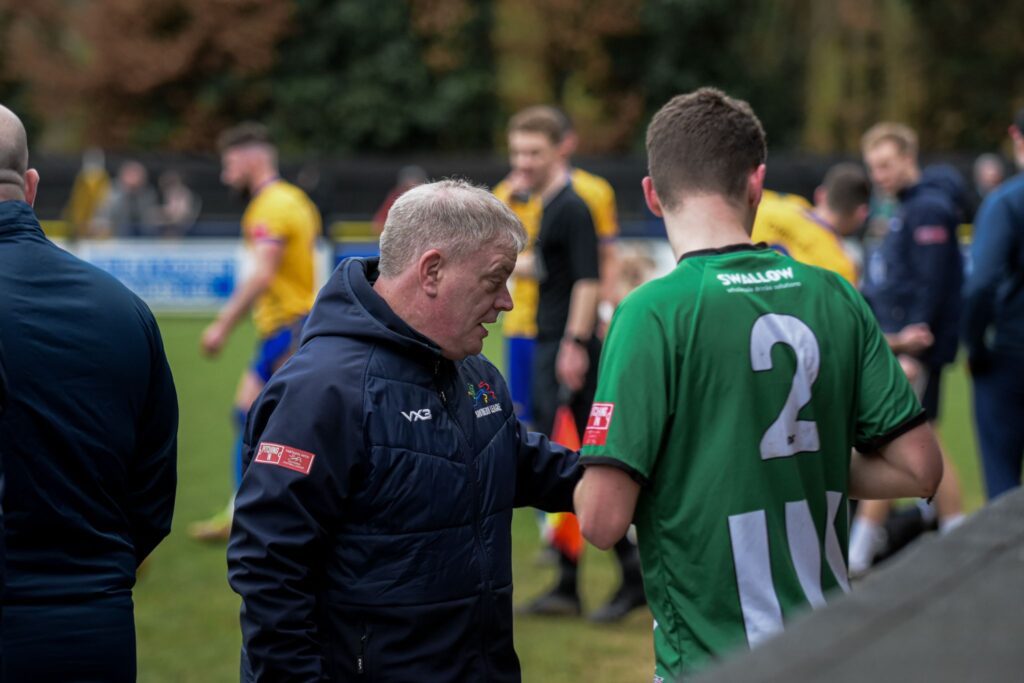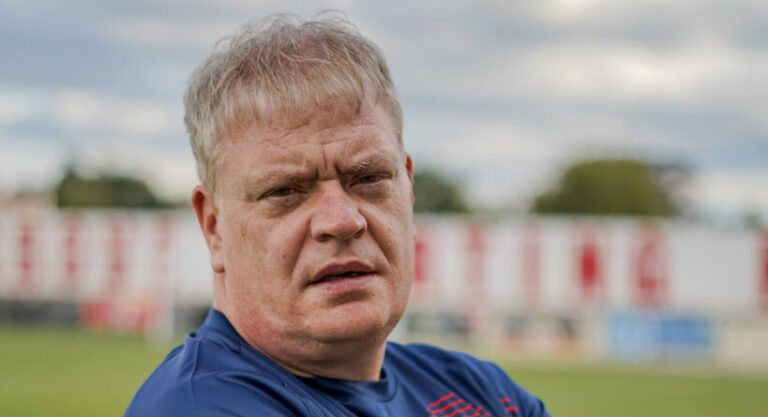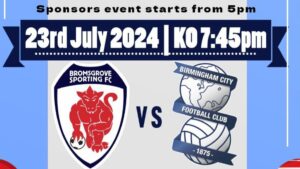This Saturday’s match versus Needham Market will be our sports physiotherapist Gavin Blackwell’s 1000th league game at Step Three and above. To mark this incredible achievement, Gavin has taken a look back at the ups, downs and everything in between of the last 999 matches…
Working for a football club, in whatever capacity, is not so much a job and more a way of life. Your title or job description defines a narrow view of your function, and the broader application of being a member of the staff team is probably more accurate as your role usually covers a multitude of day-to-day problems.
As an experienced injury man, I have always been justifiably proud of the relationship of player and physiotherapist. The players are all performers and I can only openly admire the absolute courage of those who go out and play before 5,000 critics – or even five.
Many different issues inevitably crop up when dealing with around 20 players, who produce their different challenges in a strange world of changing values and ability assessment. Staff, in whatever capacity, must be available at all times to listen, help, advise, correct, guide and keep a ‘finger on the pulse’ of players‘ problems, real or imaginary. Whilst qualifications are an essential pre-requisite for a club physio, the right personality is equally important.
As a general rule, someone who stays outside the emotional hysteria of results and the heat of the moment, is probably best equipped to deal with snap decisions that have to be made on the pitch and the transient drama of some day-to-day problems. The non-clinical and soft skills are just as important as the clinical ones.
The only titles that concerned me are those that you try to win on the field.

Highs and Lows
You go through periods of success. I think of Ron Smart at my first club Oldbury United, John Morris and Stewart Hall at Halesowen Town, Chris Turner and Keith Downing at Wolves, Rob Smith at Hednesford Town and Joe Jackson at Stourbridge as managers who have provided those sorts of eras. They were incredible highs, which meant not just the different clubs buzzing but the community as well. I remember someone saying to me at my first club, ‘you need to cherish this because it will probably never happen again in your career’. I was thinking it was going to be like that for the rest of my time in football, and it hasn’t been! But there have been magical times with successes, fans really enjoying it, the whole thing.
Then you go through periods of slump. The fans aren’t happy if the team’s not doing well. Everything is different and there’s a cloud over the whole place.
Highlights
Football is so intense that you don’t have time to sit back and look at what you have achieved. It’s a privilege to have shared in successes but, in the heat of the moment, you don’t really take in all that euphoria. Only later, on reflection, do you start to realise how momentous some occasions were. You were so focused and concentrating so hard on doing your job that the celebrations were largely for others.
There will come a time when it’s certainly removed from those days of making big calls that influence, or give calls to, historic moments. When you get it right, nobody is ever going to say ‘brilliant’. But had I got it wrong…
It’s a risk-versus-reward balancing act that helps determine whether there is success. At the time, you don’t take it all in, but you sit back later and think, ‘wow, what a difference that has made.’ You do feel the pressure, fans‘ expectations and, to a degree, the media circus that goes with it. It becomes part of your make-up and you have to understand the players are under pressure, the manager is under pressure, and reactions to an injury might be different due to that pressure. There might be some ‘overlay’ to an injury because of things going on outside. It plays a big part and the understanding of that influences the way you work. Football is very demanding and backroom staff can sometimes be forgotten.
I have been at the core of the clubs – a witness to, and participant in, a host of triumphs and disappointments, seen managerial changes and everything else in between. I have had fantastic times around dressing rooms for so many seasons. You see it all – narrow wins, big wins, defeats, arguments, celebrations, fighting. A dressing room can be a brutal place – it’s sink or swim for a young physio especially – but I quickly grasped the importance of keeping your head above water. I got huge amounts of stick but also credibility for dealing with that and it has stood me in good stead.
There have been so many memories that it’s hard to do them justice. I have been incredibly lucky to have been a part of many successes, such as Halesowen Town winning the Southern League Midland Division title, promotion to the Southern League Premier Division, Birmingham Senior Cup, Worcestershire Senior Cup and securing promotion to Step 3. Seeing no fewer than 12 players move to professional clubs and bring in a quarter of a million pounds in transfer fees was also brilliant.
I was on board when Hednesford Town won promotion to the National League North, the Southern League Cup also, runners-up, play-off winners, Birmingham Senior Cup, Staffordshire Senior Cup winners – a quadruple season with them.
I have been involved in the FA Cup first round proper a number of times, with Halesowen Town, Hednesford Town and Stourbridge. At Halesowen, we cut Rushden and Diamonds’ 16-point lead and took the title race to the last day by finishing with 92 points (to Rushden’s 94). We lost only four games and narrowly missed promotion to the Conference (now the National League). It wasn’t a bad achievement considering there were no play-offs and we won at Nene Park on the day the £85,000 signing Carl Alford made his debut for them.
While these accomplishments are memorable, it’s the relationships and bonds you build with people the players, managers, staff, club officials and supporters that are most important. I’ve been fortunate to have had a wonderful career. There have been times when it has been stressful or things haven’t worked out for club or team, but you have to keep going. You must keep plugging on, no matter what. That’s what I will do for the rest of my time.
As a physio, you have to take the club’s view into account, plus your own manager’s view and then, crucially, the players’ welfare. Often, those three perspectives don’t marry up but you have a duty of care to the player and the profession.
A manager may play a player that you feel is not quite right. But that doesn’t mean he is overruling your view. He must make a decision based on advice from many sources against complex backgrounds. I remember a manager saying that a player was worth having in the team carrying a slight problem, and I understand what he meant. It’s not all black and white.
What is important is you look after ALL of your players, from the most senior through to the injured schoolboy. They all need looking after to the best of your ability.
Disappointments
Finishing runners-up with Hednesford to Truro, missing out on the title and losing a dramatic play-off final to Salisbury City on penalties hurt us all. Likewise, losing to Altrincham in the National League North play-off semi-final with virtually the last kick of the game was a painful one.
I treat the players no different whether we win, lose or draw, even if the atmosphere is completely different. I pride myself that I am the same guy and have the same attitude. You don’t want to be one of the guys who only ‘sings when you’re winning’.
It’s a long ten months, buts eventually you get to March and April and it puts a spring in the step. It gets lighter and milder, the clocks go forward, weather-ravaged pitches are on the mend and you might finally get back on the training ground for the business end of the season. There will be three basic situations at this stage. You are either hoping to go up, hoping to stay up or something in between. Over my long career, I have experienced all three.
How things have changed
I’ve rolled with the massive changes, both in football medicine and football itself. But the pressures have remained throughout.
Not much has actually changed in terms of physio work. I still maintain all the tried-and-tested programmes, systems and methods of match preparation. Some methods of treatment have changed but there are still basic standards laid down, and I generally stick to the approved ways.
Certain injuries respond to new ideas and I try keep abreast of these. You’re always learning in this game.
The Best and Worst Aspects
I often get asked this question. For me, the best is winning, the worst is losing. Long trips back from games when the team have lost bring unpleasant feelings, but, in contrast, the elation that goes with victory sets everything up for the following week.
Having said that, as part of the job I try to stay outside the results. My job is to carry on doing the same thing, whether the team are doing well or not.
Another big disappointment is seeing managers lose their jobs, as they all work so hard for success.
As I said earlier, it is a way of life. You get a sort of tunnel vision where you don’t see anything else. My kids grew up all around football. My wife lived all around football. Holidays were all around football. You miss weddings, stag dos and family functions. You don’t see much else apart from football.
Longevity
You have to love what you do and have a passion and thirst for the industry. It has to be in your blood, and you need an ability to stay ahead of the game. You must be inquisitive and look for opportunities to improve yourself, your trade and craft and also be good at building relationships to ensure you keep moving forward. Roll with the punches when they come.
There is a lack of appreciation among fans because they don’t know about the suffering a sacked manager goes through. They think: ‘Great! A new manager!’ But there can be knock-on effects.
Longevity in the game is only possible for those willing to show resilience and the capability to adapt to demands which can change from one day to the next. Doing the basics well, injury management is art-based over science. You have got to have the same enthusiasm as on your very first day. Tomorrow may be your last day anyway.
Getting players ready to win on match day is what it’s all about. A lot of people see me running around the pitch on a Saturday but that’s a small part of the job.
Basically, when the team wins, you share the victory. The feeling of winning promotion and the celebrations that go with it are wonderful. But, as a physio, you also get pleasure from seeing a long-term injured player return to the pitch and complete their first game safely. That is emotional because you’ve often worked together for so long. And if a player you feel did well to get on the pitch after a minor knock scores, it brings an additional satisfaction. You know you have played a part in the team’s success, and that justifies the hours of hard work.
The enjoyment is for about 20 minutes on a Saturday when you have won, after which you are thinking: ‘Who can I get fit for the next game?’
The public won’t stand for prima donnas. These men go on their stage week after week. On matchdays, we physios are just psychological props. We are there to facilitate performance and what the players are trying to do and to make the task a little bit easier in any way we can.
A physio’s work is never done, not when every match or even training session can produce a range of injuries from the most minor strain to something eminently more serious and long term. Yet a teenage and adult life spent in football have left me with a matter-of-fact capacity to take what comes in an unruffled stride. Behind the scenes, there is the dressing room with its banter and its insecurities. Out in front is the crowd, the audience the floodlights, the spotlights. A place where players must perform.
Football operates under extreme pressure. There is little time for management and staff to deal with anything other than the immediate demands of the next fixture. Football is the ultimate in unpredictability and I like that my first gaffer told me on my first day that, ‘a football club is a place of turmoil – expect nothing less’. A total of 37 seasons across the various levels have passed in a blink. All the clubs have been good to me, and I would like to think I have been good for every club I had the privilege to work for. I must thank all the managers and players I have treated, for their trust and belief in me, without which I could not do my job.

















